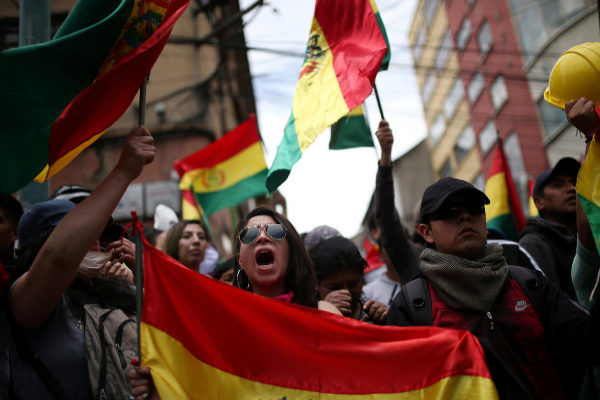- Bolivia: Police uprising in Cochabamba and Santa Cruz against Evo Morales
- Social outbreak: The spiral of violence takes another life in Bolivia
Evo Morales, on which all national and international views fall, took several hours to react. After the violent protests and riots in the country, the president has called the political parties to dialogue. He knows that the strategy used in 2016 to ignore most of the country is no longer useful. That year he lost 48% to 51% of the referendum that allowed him to run for his fourth elections, something he finally obtained thanks to judicial collusion. "Our democracy is at risk due to the coup d'etat that violent groups have launched that undermine the constitutional order," the indigenous leader had cried shortly before, who summoned his followers to "peacefully care" for democracy.
The police rebellion confirms that the numbers of the electoral equation imposed by Evo Morales do not come out. As if it were the dominoes that are falling one after another, police headquarters in different cities and regions joined the first riot of hundreds of agents of the Tactical Unit of Police Operations (UTOP) in Cochabamba, the third city of the country. To the protests of the opponents for the alleged electoral fraud were also added the ignored claims of some policemen quartered for 20 days and who refuse to repress the population.
The first images of Friday afternoon's rebellion are already part of the 21st century Bolivian history. On the roof of the barracks, waving national flags and with a banner against "fraud", the police of Cochabamba were acclaimed by an inflamed population, agglomerated at their feet. In Santa Cruz, stronghold of the opposition, the mutiny took several hours to consolidate. But the mutiny seemed to have no brake , despite calls for government dialogue and despite the immediate dismissal of the police commander in Cochabamba. This command supported the clash groups of the ruling party, which according to the first investigations are the authors of the three murders produced during 20 days of protests.
The contagion arrived this Saturday to La Paz. The termination of the main police authority was also forced in the capital while some police officers joined the protests and others remained faithful to the government. The most dissatisfied say they will not comply with the orders to confront their people. Despite these arguments, the government plays the letter of convincing the police to overcome their "discomfort" and dismiss the intervention of military forces. Meanwhile, the Church has urged to depose violent attitudes. "Not one more dead," claims the Bolivian clergy.
Evo's arguments do not convince, much less, the opposition. " The only protagonist of the coup d'etat is Evo when he made a monumental fraud. The claim is the call for a new election. Evo must move away from the presidency within the framework of the Constitution," said candidate Carlos Mesa , whose moderate tone differentiates, and separates, from the hard opposition, which has taken the street. In front, Luis Fernando Camacho, president of the Pro Santa Cruz Civic Committee, who remains in the capital demanding the resignation of the Bolivian president.
The government tried from the first moment to calm the spirits, an almost impossible task in a polarized country, even split in half in their wishes of how they want to be governed in the coming years. The government Social Movement Movement (MAS) maintains the fidelity of most indigenous ethnic groups, as well as from the popular classes, unions, miners and coca growers. Its strength is concentrated in the west and in rural areas. In front, the cities and the eastern area, known as the Crescent, middle classes and students who have only known the government of Evo Morales for 14 years.
The police rebellion also coincides with the disclosure made public by the Ethical Hacking company, chosen by the Supreme Electoral Tribunal (TSE) to conduct an audit of the 20-O general election process. Its manager, Álvaro Andrade, assured the national stupor that " the process was vitiated by nullity ." The technician added that "there were about seven critical vulnerabilities. It was possible to intercept and read all the communications of the TREP (Transmission of Preliminary Electoral Results), which means that the votes could be seen and changed." In short, convincing evidence for the opposition that the TSE authorities intervened when the possibility of holding a second round was discovered.
The TSE defended itself by rejecting such conclusions and insisting that it will await the results of the audit of the Organization of American States (OAS), which will be announced next Wednesday.
According to the criteria of The Trust Project
Know more- Evo Morales
- Bolivia
- World
BoliviaEvo Morales proclaims winner and denounces a coup in Bolivia
Elections in Bolivia An insufficient victory of Evo Morales forces a second round
Elections in BoliviaThe Bolivian opposition rebels against the "scandalous electoral fraud" of Evo Morales

